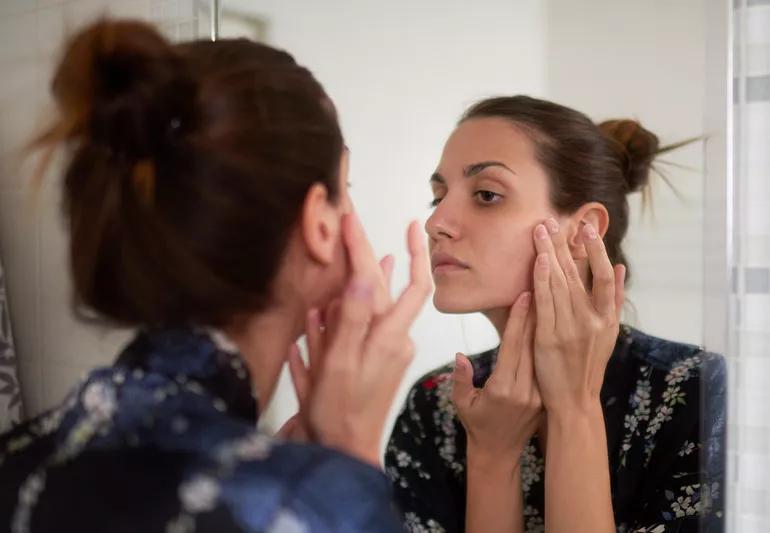From bad hair to brain drain

By Kristin Kirkpatrick, MS, RD, LD
Advertisement
Cleveland Clinic is a non-profit academic medical center. Advertising on our site helps support our mission. We do not endorse non-Cleveland Clinic products or services. Policy
If your diet’s in need of an overhaul, it’s not just your waistline that will let you know.
Sure, weight gain can indicate the need to rethink what you’re putting into your body. But evidence also shows that many other health problems have roots in poor dietary habits.
These signs don’t typically surface overnight, so watch for them over time.
Your organs require adequate nutrition to function properly, and healthy hair follicles are no exception. Starvation diets that lead to severe protein-energy malnutrition can cause brittle hair — or worse, hair loss. Studies show diets that are low in protein, essential fatty acids, and nutrients such as vitamin C, zinc and iron are associated with hair loss, hair thinning and loss of pigmentation. Aim for lean sources of protein (think eggs and grilled salmon), plenty of fruits and vegetables, and seeds and nuts for healthy hair.
Aging is inevitable. But a growing body of research indicates a nutritious diet can promote skin health and delay outward signs of skin aging. A 2012 systematic review reported that a diet rich in vitamins A, C, D and E — in addition to key antioxidants and flavonoids — has beneficial effects on skin. To get the benefits, and a more youthful appearance, consume five or more servings a day of fruits and vegetables.
Advertisement
Inflamed or bleeding gums and cavities are both signs of a poor diet. Too much sugar is a culprit for cavities. If you find yourself at the dentist for fillings, think about how many sugary drinks and foods you are consuming. In addition, swollen or bleeding gums often are associated with getting too little vitamin C in your diet. You can boost vitamin C with foods such as strawberries, tomatoes, leafy green vegetables and potatoes.
Do you have trouble with your memory or with concentration? Struggling with fatigue? The brain depends on good nutrition to perform its best.
An adequate intake of omega-3 fatty acids is especially important; it plays a part in cognitive development at all stages of life.
To get plenty of omega-3 in your diet, choose foods such as walnuts, flaxseed, fish oil and wild salmon.
Both diarrhea and constipation can surface if you aren’t eating enough fiber. Unfortunately, the majority of Americans fall short of the recommendations for fiber intake — 25 grams per day for women and 38 grams per day for men. If you are tired of digestive discomfort, try bumping up your fiber intake by eating more whole grains such as brown rice and oats, in addition to nuts, seeds, and fresh or frozen produce.
For a scrape, cut or larger wound to quickly and sufficiently heal, it needs an adequate supply of nutrients. If you heal slowly, poor nutrition may be to blame. Poor diets affect the strength of new tissue, recovery time and how well your body fights off any infection that creeps into a wound. Studies have shown that sufficient intake of calories, protein and nutrients is essential for proper wound healing. Focus on maintaining a healthy, balanced diet. Your immune system will thank you.
Poor nutritional habits can compromise your immune system and trigger illness and infection. If you are constantly under the weather, you could benefit from eating more nutrient-rich foods. Optimal nutrition can help reverse a compromised immune system. Choose foods high in vitamins A, C, and E, zinc, selenium, iron and folic acid. Start by increasing your intake of fresh fruits, vegetables and whole grains—specifically citrus fruits(like lemons and limes), leafy greens, popcorn (skip the extra butter and salt) and brown rice.
One final note: A 2019 study showed it’s generally best to get your vitamins and minerals through food, so don’t rely on supplements to try to compensate for poor food choices.
Advertisement
Learn more about our editorial process.
Advertisement

The flexible eating plan aims to boost your brain health by focusing on plant-based foods and limiting saturated fat

Designed to lower your blood pressure, this eating plan focuses on heart-healthy foods like whole grains, fruits and vegetables

Pescatarians don’t eat poultry, game or red meat, but they do eat fish and seafood, dairy and eggs

This eating style has many health benefits, including weight loss, an improved microbiome, and increased nutrient and mineral consumption

Research shows promising results from options like the DASH diet and Mediterranean diet

Some people can safely lose weight on just 1,200 calories — but it’s not right for everyone

The Mediterranean diet, DASH diet or more plant-based eating plans can improve heart health

It’s a type of intermittent fasting that restricts calories two days per week

If you’re feeling short of breath, sleep can be tough — propping yourself up or sleeping on your side may help

If you fear the unknown or find yourself needing reassurance often, you may identify with this attachment style

If you’re looking to boost your gut health, it’s better to get fiber from whole foods